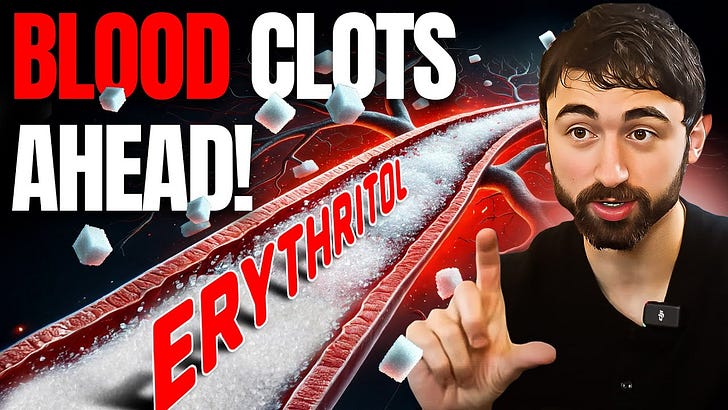Is This The End of Erythritol?
New research compares the effects of allulose vs erythritol on platelet aggregation and blood "clottiness" in animal models, and draws from gene expression data in patients with Sickle Cell Disease.
There have been several high-profile papers citing risks related to the common no-calorie sugar alcohol erythritol, common in products like Lily’s chocolate or Halo Top Ice Cream.
Specifically, there is concern over whether erythritol promotes blood clots and can contribute to cardiovascular events.
There’s now a video covering the content reviewed in this letter. If you prefer to watch, click below. Otherwise, read on…
New Research: Erythritol vs Allulose and Sickle Cell Disease
Now, new research has approached this question from a complementary angle, and with interesting results.
The researchers looked at pathways related to platelet aggregation, the basis of blood clot formation, in mice fed a high-carb, high-fat (Western-style) diet. They found the Western-style diet increased pathways related to platelet aggregation and blood clots, and that erythritol exacerbated this effect.
In effect, erythritol was the cherry on top of the blood clot Sundae!
How is that for dark chocolate humor!
Using what’s called “Gene Set Enrichment Analysis,” they also looked at genetic pathways up- and down-regulated in Sickle Cell Disease (SCD), a common genetic disorder characterized by blood clots. To do so, they used data from 18 human patients with SCD and 12 healthy controls.
They found that erythritol mimicked many of the pathways up-regulated in SCD.
Quoting from the paper, “Erythritol Mirrors Sickle Cell Disease Pathways.”
They also tested another sugar substitute. The rare natural low-calorie sugar allulose.
Opposite to erythritol, which increased platelet aggregation and SCD pathways, allulose reduced the blood clot effect.
You can see that clearly here, in Figure 3A (recreated for ease of reading) which shows a Dot plot of SCD gene groups organized by treatment. Each row is a gene group, and each column is a treatment, with Red indicating pathway up-regulation and Blue indicating pathway down-regulation.
What’s critical to point out is that SCD (column 1) and Western diet (column 2) lead to increases in these blood clot pathways.
And erythritol treatment further exacerbates the effects of the Western diet (column 4).
But allulose is the standout, clearly having an opposite effect since it’s the only column on the Blue (down-regulation) spectrum.
It's literally as clear as night and day!
Erythritol vs Allulose and Mitochondrial Function
In trying to dissect the mechanism underlaying the opposing effects of erythritol and allulose on platelet aggregation (and by extension blood clotting and possible cardiovascular risk), the researchers examined the effect on mitochondrial function pathways.
They found that erythritol caused down-regulation of electron transport chain and ATP synthesis pathways, hindering mitochondrial function. This was in parallel to SCD. By contrast, allulose again had the opposite effect, enhancing electron transport chain and ATP synthesis pathways, predicted to reduce harmful oxidative stress and boost mitochondrial function.
As stated by the authors, “The ability of allulose to improve ATP production and mitigate oxidative stress could be a critical mechanism through which it modulates platelet function and reduces the pro-thrombotic environment,” and, “allulose as a safer alternative to erythritol, particularly in individuals at heightened risk of thrombotic events.”
Conflicts of Interest
Because I know it will be a question, this research was funded by “National Research Foundation of Korea under Grant Numbers 2022H1D3A2A02081567, RS-2023-00213596, and RS-2024-00342528.” And “the authors report no conflicts of interest.”
I was, in no way, involved in this research or it’s publication.
I am, however, on the Scientific Advisory Board of RxSugar, a company that specializes in the sale of allulose-based products. I joined the board because I found the science genuinely fascinating, and respect fellow members of the board like Dr Dominic D'Agostino, Dr Benjamin Bikman etc. If you’re interested in their products, you can use discount code NICK 20, but I do not receive revenue share or compensation for sales.
Truthfully, I believe in the company and its mission to displace sugar from the food environment with a metabolically superior alternative. Do you “need” sweet, metabolically? No. But, practically, many people will choose to have it. And I think this is the best option as far as sweet goes.






Except for the very infrequent exception, I gave up all sweeteners almost two years ago and have never looked back. I honestly don't miss them
ever and forever open minded and extremely curious